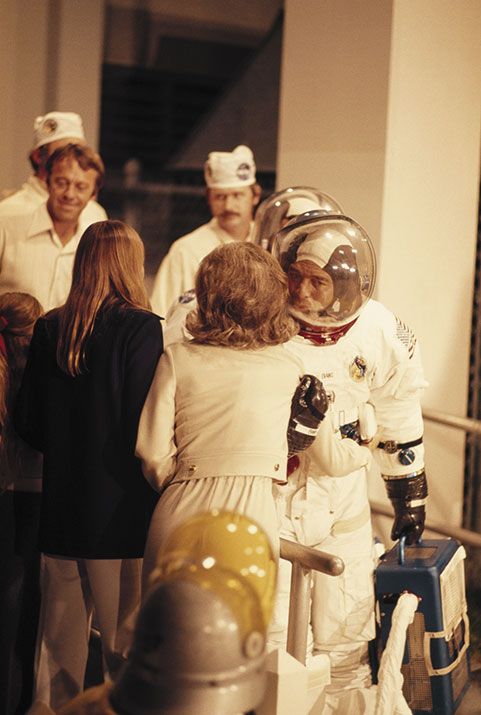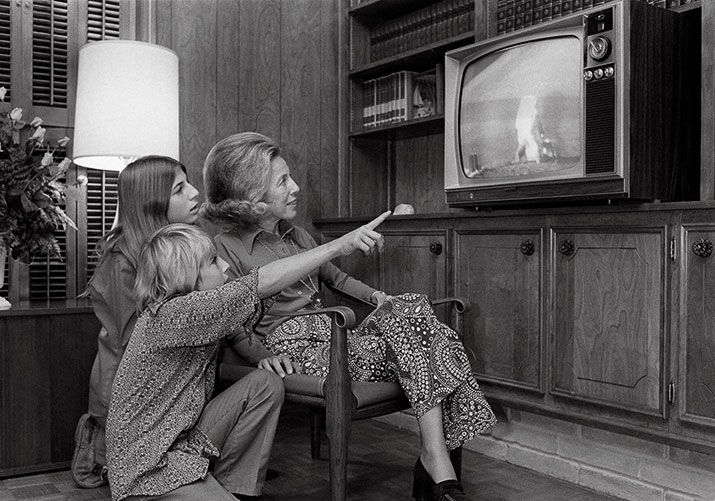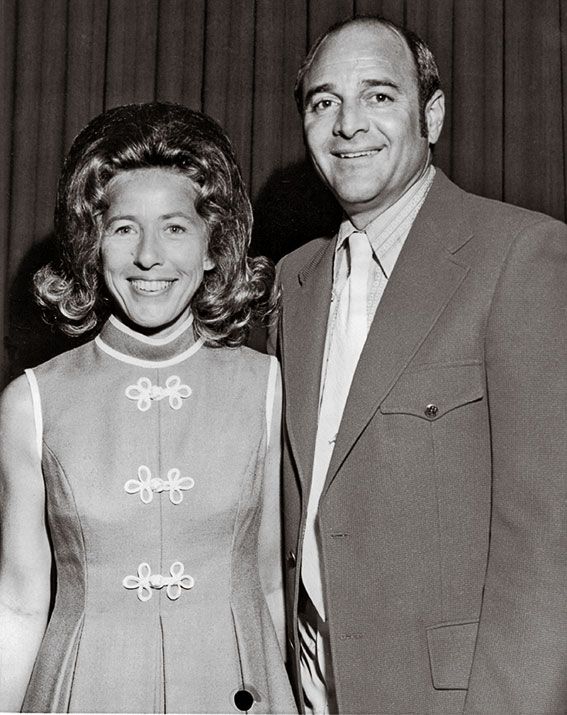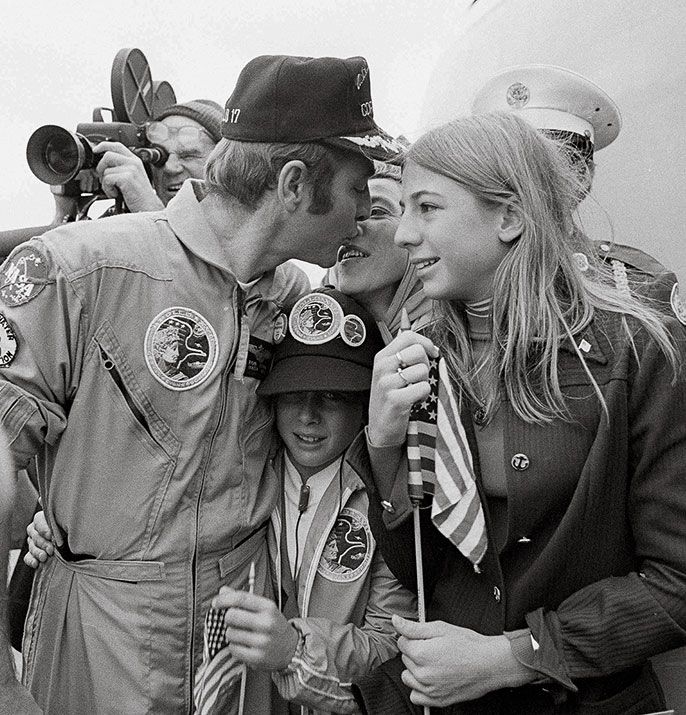Jan Evans recalls how it was for the families of moon voyagers in the Apollo era.
The Astronaut’s Wife.
/https://tf-cmsv2-smithsonianmag-media.s3.amazonaws.com/filer/Astronauts-Wife-631.jpg)
Ronald E. Evans was a U.S. Navy pilot and combat flight instructor when he was selected in 1966 as one of 19 NASA astronauts. With his wife, Janet, and children, Jon and Jaime, he settled in Houston shortly thereafter. Evans was a member of the astronaut support crews for Apollo 7 and 11, and was the backup command module pilot for Apollo 14. His sole launch was as command module pilot for Apollo 17 in December 1972, during which he achieved the record for time in lunar orbit (nearly 148 hours). He also logged just over an hour of spacewalk time. Evans died of a heart attack in his sleep in 1990, at age 56.
Historian Jennifer Ross-Nazzal of NASA’s Johnson Space Center in Houston interviewed Janet Evans for the center’s oral history project by phone in August 2003 while Evans was in her home in Scottsdale, Arizona (Ross-Nazzal and Evans are still at those locations).
ROSS-NAZZAL: When did you move to the Clear Lake area in Texas?
EVANS: In 1966. The procedure started late in 1965. Ron was selected as an astronaut. He was in Vietnam, flying off of the aircraft carrier Ticonderoga. He got home the 28th of April, had to report to NASA the 2nd of May. So we did a lot of washing and ironing, and he was on his way. The children and I went down after they got out of school in June.
Tell us about the Clear Lake subdivision in Houston.
The people were all from someplace else. There were a lot of astronaut families, a lot of people connected with the different contractors, and you soon developed very close relationships with families. Everybody took care of everybody else. We still have reunions. When we moved to Arizona in 1977, our children said, “We don’t like this. People don’t wave or smile or say hello.” They were used to that laid-back, friendly Texas way of living.
How did all these people come together to create that community?
Everybody was working on a very exciting, challenging project. Everybody’s dad somehow worked for NASA and everyone had one goal in mind: to eventually send man to the moon. That was in a day and age when most women were stay-at-home mothers. The fathers of the families were gone a great deal of the time, and yet they had very strong wives and families who could function without them. All astronaut wives are seriously loyal to one another and have been from the beginning and will be forever. There was no Astronaut Wives Club: We didn’t feel that we were any different than anybody else and didn’t want to set ourselves apart. The only time we wavered from that is when we had a luncheon and invited all of the prisoner-of-war wives from the area.
Did NASA create the community?
Only because NASA is where the jobs were. NASA itself didn’t say, “Oh, here. We welcome you. Do this.”
How did the community differ from Miramar Naval Air Station in San Diego, where you moved from?
You had squadron camaraderie, definitely. Ron had two tours of Vietnam. You couldn’t talk. You never said where your husband was or what his job was. The wives would get together, but some were in great fear. Frankly, they were not pleasant to be around, because the majority of us still went on to live and had our children and our activities.
How did your husband’s long hours and extended travel affect your family?
Once we got to NASA, we saw much more of Ron. When he was a Navy fighter pilot, he would be gone anywhere from six to 10 months at a time; home four months, gone again six, eight, 10 months; home for a month. In Houston, we got to see him almost every weekend for at least 24 hours. In fact, I felt like I was having Friday-night affairs.
Tell us about your own personal involvement in community organizations.
Raising your children was the top priority, so my involvement was mainly due to them—one in preschool and one starting first grade. Our son, Jon, had Little League football. Ron was involved in that, and he did soccer too. He was in town one Saturday for a soccer game. One of our neighbors was also called Ron, Ron Ammons. Everybody would get him confused with Ron Evans. Ron had to run up to the place you buy lumber, and we were playing in Clear Lake City. Jon got flipped in the air and broke his collarbone, and so the coach came up to Ron Ammons, who said, “Well, I’ll get him on to the hospital. I’ll go get the car.” I go with them to the hospital, and Ron Ammons is giving all the information, which he knew, and they’re taking Jon up in a wheelchair to X-ray, and the nurse said something like, “Now, your daddy can come on up here with you.” Jon turned around and said, “That’s not my daddy.” Even the coach had thought he was. Then, about five minutes later, Ron came walking in. So that’s what I mean when I say we all had pseudo families, everybody knew about everybody else. You never knew what a day would bring. When Ron was home on a Saturday, he would load up his Suburban with 10 or 12 neighborhood children and take them to the local dump, where they could pick out whatever treasured thing they wanted to take home with them. The neighborhood children all have fond memories of him.
There was one tragedy and one near-miss, the Apollo 1 fire and the flight of Apollo 13.
At the time of the fire, Ron was on a support crew for that. In fact, he’d been in that spacecraft running tests the afternoon before that fire. This was a very crushing blow. When something like this happens, you gather around for moral support. That’s all you can do. Anything and everything is there for you to reach out if you needed it. You just had to say, “I need somebody to hold my hand,” and you’ve got hundreds of people there to do it.
One night the phone rang during Apollo 13. A lot of the news media were there, because we knew them so well. Everybody had just gotten their plates filled and were sitting around on the floor ready to eat. Tom Stafford got the call, and he said something to Ron. Within five minutes, the entire house was void of all men— very quietly, nothing said, no big to-do. All these women thought, Hmm, something must be wrong. All the guys are gone. So you really didn’t see your husbands again for a couple of days, and then they began calling and saying, “Hey, there’s a problem. We’re all working in the simulators or we’re doing this.” Everybody said, “Oh, okay.” You don’t panic, because that doesn’t do any good. You just say your prayers, you offer your support, and you gather around those people involved. And that’s it. They worked out a new way to get the fellows back.
Did you spend time with the family members involved in the flight?
Everybody gathers around the home. You are together when they step out of the lunar module on the surface. You’re together during launch, and you’re together during splashdown. NASA connected a squawk box in our home, so we could listen to all the air-to-ground communications.
How did your neighbors deal with the publicity you received with Ron being an astronaut?
During Apollo 14, when Ron was on backup, the day came when he was supposed to leave for quarantine. The night before, we’d taken the children to the Astrodome to cart races or big-truck races or something. We got home, and there was this huge billboard electric sign in our front yard that was all lit up that said, “Jan’s Motel.” Of course, we just nearly died. We knew who had done it. We got in the house, and the bed was short-sheeted. There was an ice bucket there with champagne. We finally got the kids to bed, and Ron and I got in bed. All of a sudden, there are voices in our bedroom. We finally found a speaker up in the attic after we pulled down the attic steps and got full of insulation. The neighbors were all out in the back field behind the house, hysterically laughing.
By the time Ron flew on Apollo 17, there had been a threat by the Black September group that had wreaked havoc with the Olympics over in Germany [in 1972]. They had made a threat on the families of the Apollo 17 crew. We had security out in front of our house 24 hours a day. We didn’t know about this until the day before they left.
Did you play practical jokes on your neighbors?
One of them, we thought they were too slow getting these dead bushes out of their front yard, and so we spray-painted them green. Their kids got up the next day and thought they’d actually come to life. Firecrackers got set off in your doorway when you had a birthday. One time we put the motor out of a car in one of the neighbors’ front yard.
The homebuilder’s office was in the lot at the corner of our cul-de-sac. He had torn down the office, so there was this big earth-moving machine out there. You get a bunch of engineers, and they’ve got to go down there and check this out. Then pretty soon, my Ron’s up on that thing, and the next thing you know it’s running. Of course, the kids are beside themselves with excitement. All of a sudden there’s an El Lago police car sitting at the corner. Pretty soon there’s another police car. Of course, this excites the children all the more. All these engineers climbing all over this thing trying to figure out how to turn it off. They finally had to literally cut the fuel line. They were a bit embarrassed when they had to go apologize to the builder on Monday. Of course, Ron had to leave town Monday, so I went over with the fellows to apologize. I still get embarrassed about this, but nothing embarrassed Ron.
What impact did the women’s movement have on your life while you were in Clear Lake?
The women’s movement has never had an impact on my life. I was liberated the day I was born by my loving parents and my sister, and then by my husband. I never had to ask permission. I was always appreciated. I was always thanked.
You’ve evoked a lot of memories. It was a very wonderful family experience being down there and being a part of the program. I wish Ron were still here, because he loved talking about it. I look at it now, reaching 70 years old. We came down there as mere children, who had our own children, and were given this tremendous opportunity to contribute.



